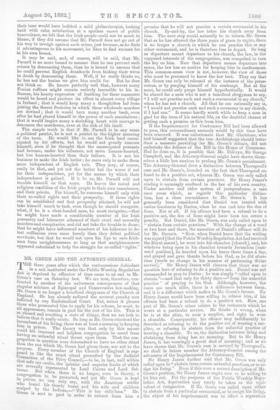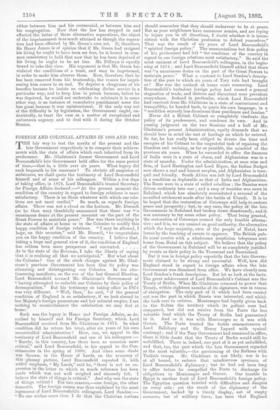MR. GREEN AND THE ATTORNEY-GENERAL.
THE three years after which the contumacious defendant in a suit instituted under the Public Worship Regulation Act is deprived by effluxion of time came to an end in Mr. Green's case on Saturday last. We are now, therefore, con- fronted by another of the unforeseen consequences of that Singular mixture of Episcopal and Conservative law-making. Mr. Green is no longer a beneficed clergyman of the Church of England. He has already suffered the severest penalty now inflicted by any Ecclesiastical Court. But, unless it pleases those who prosecuted him to apply for his release, he must, to all appearance, remain in gaol for the rest of his life. This is SO absurd and revolting a state of things, that we are lotla to believe that it really exists. So long as Mr. Green rdmained the incumbent of his living, there was at least a meaning in keeping him in prison. The theory was that only by °this means could his innocent and helpless congregation be saved from having an unlawful ritual thrust upon them. That the con- gregation in question were determined to have no other ritual than the one which Mr. Green had given them, was not to the purpose. Every member of the Church of England is sup- posed to like the exact ritual prescribed by the Judicial eoromittee of the Privy Council,—to be, in fact, well within that safe via media, the inferior and superior limits of which are severally represented by Lord Cairns and Lord Sel
b - orne. But when there is no longer, even in theory, a congregation to be protected, and yet Mr. Green is kept in prison, we can only say, with the American settler who found his shanty burnt and his wife and children scalped by the Indians,---" This is too ridic'lous." Mr. Green is sent to gaol in order to extract from him a promise that he will not practise a certain ceremonial in his church. By-and-by, the law takes his church away from him. The next step would naturally be to inform Mr. Green that as he has allowed the three years of grace to expire, there is no longer a church in which he can practise this or any other ceremonial, and he is therefore free to depart. So long as departure meant departure to his church, the law, in th& supposed interests of the congregation, was compelled to turn the key on him. Now that departure means departure into space, the law has no motive for keeping him in confinement. This common-sense view is not, however, the view of those who must be presumed to know the law best. They say that Mr. Green can only be released at the instance of the prose- cutors, or by purging himself of his contempt. But at the most, he could only purge himself hypothetically. It would be absurd for a man who is not a beneficed clergyman to say, "I will not practise such and such a ceremonial in my church," when he has not a church. All that he can rationally say is, "1 would not practise such and such a ceremony in my church, if I had one." It seems hardly worth while to keep a man in gaol for the term of his natural life, on the doubtful chance of getting such a promise as this from him. If the Imprisonment for Contumacy Bill had been allowed to pass, this extraordinary anomaly would by this time have been removed. It was unfortunate that Mr. Gladstone, who had himself suggested that the two Archbishops should intro- duce a measure providing for Mr. Green's release, did not undertake the defence of the Bill in the House of Commons. Had he done so, it is possible that Mr. Dillwyn, Sir George Campbell, and the Attorney-General might have shown them- selves a little less anxious to prolong Mr. Green's punishment. The Attorney-General drew a distinction between Thorogocars case and Mr. Green's, founded on the fact that Thorogood re- fused to do a positive act, whereas Mr. Green was only called upon to abstain from certain practices. Sir Henry James's reading is seemingly confined to the law of his own country. Under another and older system of jurisprudence, a case once arose which, as regards this particular distinc-
tion, has a close resemblance to Mr. Green's. It has generally been considered that Daniel was treated with undue harshness by Darius, when he was cast into the den of lions. Not at all. If his offence had been a refusal to do a positive act, the den of lions might have been too severe a penalty. But Daniel, like Mr. Green, was only called upon to "abstain from certain practices." With the change of a word or two here and there, the narrative of Daniel's offence will do for Mr. Green's. "Now, when Daniel knew that the writing was signed [that the Public Worship Regulation Act had received the Royal assent], he went into his chamber [church], and, his windows being open in his chamber towards Jerusalem [east- ward position], he kneeled upon his knees three times a day, and prayed and gave thanks before his God, as he did afore- time [made no change in his manner of performing divine service]." Sir Henry James will observe that there was no question hero of refusing to do a positive act. Daniel was not commanded to pray to Darius ; he was simply "called upon to abstain "—and that only for thirty days—" from the unlawful practice" of praying to his God. Although, however, the cases are much alike, there is a difference between them, and it is a difference which makes in Mr. Green's favour. Sir Henry James would have been willing to release him, if his offence had been a refusal to do a positive act. Now, one part of Mr. Green's crime relates to the vestments which he wears at a particular service. He thinks it wrong, when he is at the altar, to wear a surplice, and right to wear a chasuble. Consequently, his offence may indifferently be described as refusing to do the positive act of wearing a sur- plice, or refusing to abstain fromthe unlawful practice of wearing a chasuble. To us, the distinction between doing and abstaining from doing has no meaning. But to Sir Henry James, it has seemingly a great deal of meaning ; and as we have shown that Mr. Green's case is covered by Thorogood's, we shall in future number the Attorney-General among the advocates of the Imprisonment for Contumacy Bill. Sir Henry James further said that Mr. Green was only called upon to "abstain from certain unlawful practices, or to re- sign his living." Even if this were a correct description of Mr. Green's position, Sir Henry James ought now to be willing to let him out. For the purposes of the Public Worship Regu- lation Act, deprivation may surely be taken as the equi- valent of resignation. If Mr. Green was called upon either to abstain from a particular ceremonial, or to resign his living, the object of his imprisonment was to effect a separation
either between him and his ceremonial, or between him and his congregation. Now that the law has stepped in and effected the latter of these alternative separations, the object of the imprisonment is as much attained as though the separa- tion had been effected by Mr. Green's own act. If, therefore, Sir Henry James is of opinion that if Mr. Green had resigned his living he ought to have been set free, he is bound in com- mon consistency to hold that now that he has been deprived of his living, he ought to be set free. Mr. Dillwyn is equally bound to take this view. His argument is that Mr. Green has violated the conditions of a trust, and may be imprisoned, in order to make him observe them. Now, therefore, that he has been removed from his trusteeship, the reason for impri- soning him comes to an end. To deprive a clergyman of his benefice because he insists on celebrating divine service in a particular way, and to keep him in prison because, before he was deprived, he would not undertake to celebrate it in some other way, is an instance of cumulative punishment none the less gross because it was unintentional. If the only way out of the difficulty is by legislation, the Government ought, un- doubtedly, to treat the case as a matter of exceptional and unforeseen urgency, and to deal with it during the October Session.































 Previous page
Previous page